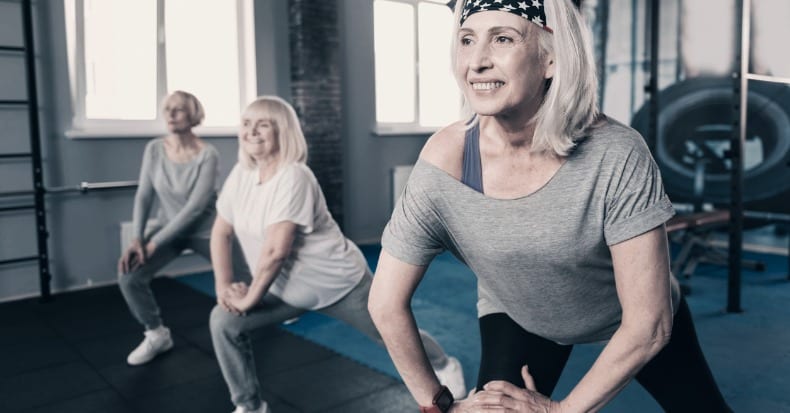As we grow older, stretching becomes a more important part of our routine, especially when hip pain is present. Whether you are about to engage in a sport, a job, weight lifting, or errands, it’s best to prepare your muscles for activity. With that said, stretching can be broken down into two main types: static (or passive) and dynamic (or active) stretching.
The available research notes that static stretching (stretching while holding one position, like reaching for your toes) has recovery benefits and is most effective at the end of a workout/competition. However, it can reduce performance when done beforehand, as it relaxes muscles, reduces blood flow and muscle strength, and decreases central nervous system (CNS) activity.
Active warm-ups or dynamic stretching have the opposite effect—they boost blood flow and activate the CNS, which enhances strength, power, and range of motion (ROM) resulting in BOTH immediate and long-term benefits. A 2014 systematic review of 31 studies reported that dynamic stretching that included sprints and plyometrics (movements against resistance) enhanced power and strength performance when compared to static stretching—which did not reduce strength. In a 2010 systematic review of 32 studies investigating active warm-up before engaging in a sport, researchers found that an active warm-up improved performance by 79% across all criteria investigated.
But what about the hip? A 2019 study compared static stretching vs. dynamic stretching of the hip joint with no-load (DSNL), with a light-load (DSLL, 0.25kg), and with a heavy-load (DSHL, 0.5kg) in an elderly population (63.2 ± 7.13 years). Participants stood sideways behind a chair (for balance), and swung one leg, as able. Researchers measured hip flexion and extension range of motion before the test, immediately after, and 60 minutes later. Compared to static stretches, all three types of dynamic stretches improved hip ROM more effectively at all time points, with DSNL being the most effective.
Here are a few hip-specific dynamic stretch options: 1) Standing Hip Circle: Stand on one leg, raise the opposite knee to 90º (thigh parallel to the floor); move the knee outward (open your hip), and make wide circles for 30 seconds/side or to fatigue (start gradually). 2) Lunge: Step forward with the right foot, lower the back knee toward the floor (as able); pause and repeat on the other leg. 3) Half Squat: From standing, slowly bend the knees until the thighs are parallel to the ground while bracing the core and maintaining a neutral low back curve.



